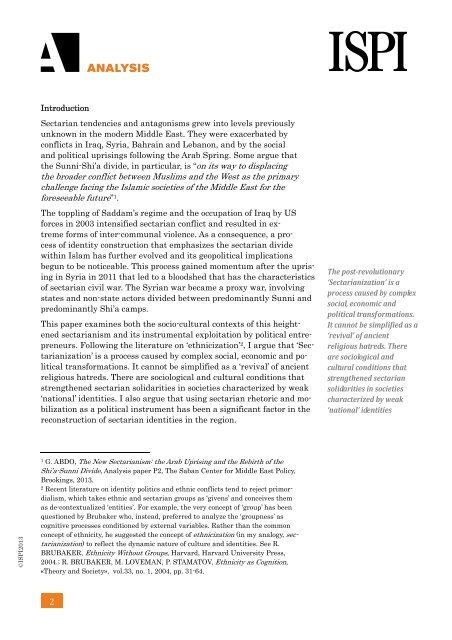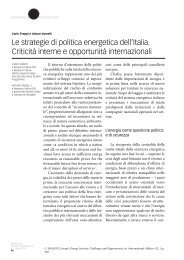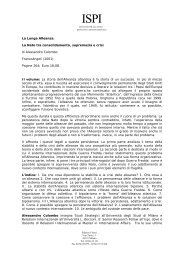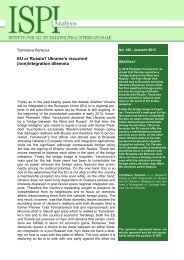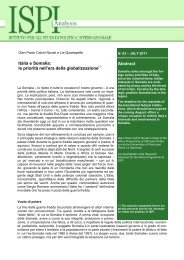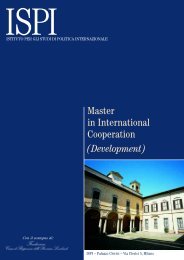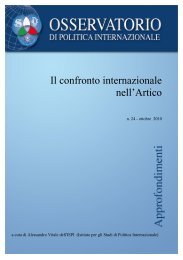heightened sectarianism in the middle east: causes, dynamics ... - Ispi
heightened sectarianism in the middle east: causes, dynamics ... - Ispi
heightened sectarianism in the middle east: causes, dynamics ... - Ispi
You also want an ePaper? Increase the reach of your titles
YUMPU automatically turns print PDFs into web optimized ePapers that Google loves.
IntroductionSectarian tendencies and antagonisms grew <strong>in</strong>to levels previouslyunknown <strong>in</strong> <strong>the</strong> modern Middle East. They were exacerbated byconflicts <strong>in</strong> Iraq, Syria, Bahra<strong>in</strong> and Lebanon, and by <strong>the</strong> socialand political upris<strong>in</strong>gs follow<strong>in</strong>g <strong>the</strong> Arab Spr<strong>in</strong>g. Some argue that<strong>the</strong> Sunni-Shi’a divide, <strong>in</strong> particular, is “on its way to displac<strong>in</strong>g<strong>the</strong> broader conflict between Muslims and <strong>the</strong> West as <strong>the</strong> primarychallenge fac<strong>in</strong>g <strong>the</strong> Islamic societies of <strong>the</strong> Middle East for <strong>the</strong>foreseeable future” 1 .The toppl<strong>in</strong>g of Saddam’s regime and <strong>the</strong> occupation of Iraq by USforces <strong>in</strong> 2003 <strong>in</strong>tensified sectarian conflict and resulted <strong>in</strong> extremeforms of <strong>in</strong>ter-communal violence. As a consequence, a processof identity construction that emphasizes <strong>the</strong> sectarian dividewith<strong>in</strong> Islam has fur<strong>the</strong>r evolved and its geopolitical implicationsbegun to be noticeable. This process ga<strong>in</strong>ed momentum after <strong>the</strong> upris<strong>in</strong>g<strong>in</strong> Syria <strong>in</strong> 2011 that led to a bloodshed that has <strong>the</strong> characteristicsof sectarian civil war. The Syrian war became a proxy war, <strong>in</strong>volv<strong>in</strong>gstates and non-state actors divided between predom<strong>in</strong>antly Sunni andpredom<strong>in</strong>antly Shi’a camps.This paper exam<strong>in</strong>es both <strong>the</strong> socio-cultural contexts of this <strong>heightened</strong><strong>sectarianism</strong> and its <strong>in</strong>strumental exploitation by political entrepreneurs.Follow<strong>in</strong>g <strong>the</strong> literature on ‘ethnicization’ 2 , I argue that ‘Sectarianization’is a process caused by complex social, economic and politicaltransformations. It cannot be simplified as a ‘revival’ of ancientreligious hatreds. There are sociological and cultural conditions thatstreng<strong>the</strong>ned sectarian solidarities <strong>in</strong> societies characterized by weak‘national’ identities. I also argue that us<strong>in</strong>g sectarian rhetoric and mobilizationas a political <strong>in</strong>strument has been a significant factor <strong>in</strong> <strong>the</strong>reconstruction of sectarian identities <strong>in</strong> <strong>the</strong> region.The post‐revolutionary‘Sectarianization’ is aprocess caused by complexsocial, economic andpolitical transformations.It cannot be simplified as a‘revival’ of ancientreligious hatreds. Thereare sociological andcultural conditions thatstreng<strong>the</strong>ned sectariansolidarities <strong>in</strong> societiescharacterized by weak‘national’ identities©ISPI20131G. ABDO, The New Sectarianism: <strong>the</strong> Arab Upris<strong>in</strong>g and <strong>the</strong> Rebirth of <strong>the</strong>Shi’a-Sunni Divide, Analysis paper P2, The Saban Center for Middle East Policy,Brook<strong>in</strong>gs, 2013.2Recent literature on identity politics and ethnic conflicts tend to reject primordialism,which takes ethnic and sectarian groups as ‘givens’ and conceives <strong>the</strong>mas de-contextualized ‘entities’. For example, <strong>the</strong> very concept of ‘group’ has beenquestioned by Brubaker who, <strong>in</strong>stead, preferred to analyze <strong>the</strong> ‘groupness’ ascognitive processes conditioned by external variables. Ra<strong>the</strong>r than <strong>the</strong> commonconcept of ethnicity, he suggested <strong>the</strong> concept of ethnicization (<strong>in</strong> my analogy, sectarianization)to reflect <strong>the</strong> dynamic nature of culture and identities. See R.BRUBAKER, Ethnicity Without Groups, Harvard, Harvard University Press,2004.; R. BRUBAKER, M. LOVEMAN, P. STAMATOV, Ethnicity as Cognition,«Theory and Society», vol.33, no. 1, 2004, pp. 31-64.2


